#Ma and Pa Kettle Films
Explore tagged Tumblr posts
Text
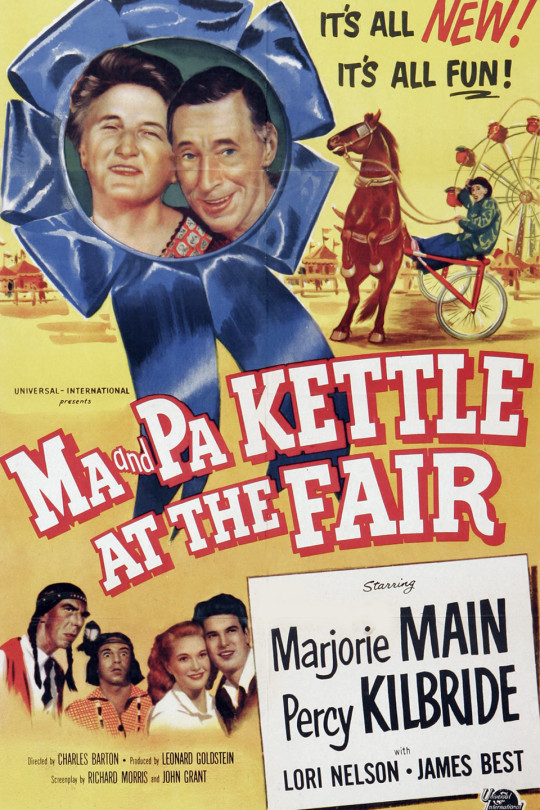
100+ Films of 1952
Film number 105: Ma and Pa Kettle at the Fair
Release date: July 11th, 1952.
Studio: Universal
Genre: comedy serial
Director: Charles Barton
Producer: Leonard Goldstein
Actors: Marjorie Main, Percy Kilbride
Plot Summary: Ma and Pa’s daughter Rosie dreams of going to college, but due to the fact that Pa never has a job, the family can’t afford it. Determined to help their daughter, Ma plans on winning prize money for her jam making and bread baking at the upcoming Fair, while Pa enters a horse race.
My Rating (out of five stars): ***¼
I actually enjoyed this more than I thought I would. Universal cranked out 10 Ma and Pa Kettle movies in the 1940s and 50s, and it was an immensely successful franchise. The folksy charm of the characters and the top-notch performances of the leads drew audiences in for years. Sometimes serials can be obviously cheap and thrown together without much thought, but many of the films in this series feel higher in quality. This edition was deftly executed and worked perfectly well for what it was trying to be-a simple film without any lofty ambitions.
The Good:
Percy Kilbride as Pa. His performance as Pa is so well crafted and amusing, it doomed his career to a specific stereotype that he unfortunately grew to loathe. But his dry line deliveries dripping with his character’s laziness are brilliant. You can’t help but love the guy.
Marjorie Main as Ma. If there is any example of a superstar character actress, it is Main. She put in so many memorable comedic performances in so many films, that she is still instantly recognizable to any Classical Hollywood aficionado. She’s a walking talking masterclass of comedic acting.
The general depth of character actors throughout the film. Virtually all the surrounding adults in the film are recognizable themselves as consistently working character actors. They add to the comedy and folksiness, boosting the quality of the movie.
The plot was lean and efficient. At 78 minutes, every scene had a purpose in tying the plot together.
There were some surprisingly good special effects with horses- both a scene where Ma got trapped on a wagon with a runaway horse and the final sequence of the harness racing at the fair. The rear projection used was pretty damn good, and the editing between stunt actors and the main cast was smooth. For a film of this budget, I was impressed.
This is just a movie that is good for what it is- a well-made comedy serial.
The fact that going to college was an aim for the daughter Rosie. I read enough sickeningly sexist articles and opinions in 1952 about women going to college, so I appreciated that even though this is a rural environment, Rosie got to have some educational ambition.
There were a couple of more sentimental heartwarming moments that felt especially sweet because they were not stretched to the point of shameless sap. A scene where Pa spoke in church and the gesture a local lady made at the end are the best examples of this.
The Bad:
The “Indians.” This was the most horrible cringy stuff in the film, and I would cut it out in an instant. Pa has two stupid lazy “Indian” friends who are even more inept than he is. They are obviously played by white men, which is gross in its own right. But I just hated every minute of it.
There was a “comedy” moment near the end where animals were getting sick because they ate bread Ma threw out that had cement powder in it. Seeing animals suffering is NOT my idea of comedy.
The famous 15 children of Ma and Pa have absolutely no character. They are mostly just a mob of unruly kids. I don’t think they all even had names! In some ways this worked for some of the comedy, but it was just weird to have the kids virtually only be a gag with no character. Rosie did have more of a fleshed-out character, but she was still very one dimensional.
Sometimes the situations the Kettles find themselves in are too wacky and unrealistic... BUT this doesn’t totally detract from the goofy fun of everything. I just occasionally got annoyed at some of the implausibility of things.
0 notes
Text

The Thin Man:
A comedy-mystery-romance and all-around fun film, this film follows Nick and Nora and their little terrier dog Asta as they try to solve a mystery in between a ridiculous amount of drinking and flirty quips. It's my personal favorite rom-com even though it's technically a mystery first-and-foremost. The chemistry between the actors playing the leads is just outstanding and it is truly one of the funniest films from the 30s.
Ma and Pa Kettle Go to Town:
Absolutely hilarious film. The Kettles win a contest that lets them go to New York City on a trip. In doing so they get muddled up with bankrobbers and monkey poisoners, the kids run feral, Pa loses a very important bag, and they just struggle to fit in the busy life of the City. It's just good, pure comedy and very worth watching!
9 notes
·
View notes
Text

Samuel Rufus McDaniel (January 28, 1886 – September 24, 1962) was an actor who appeared in over 210 television shows and films (1929-50). He was the older brother of actresses Etta McDaniel and Hattie McDaniel.
Born in Wichita, Kansas, to former enslaved, he was one of 13 children. His father Henry McDaniel fought in the Civil War with the 122nd USCT and his mother, Susan Holbert, was a singer of gospel music. In 1900, the family moved to Colorado, living in Fort Collins and in Denver where he grew up and graduated from Denver East High School. The children of the McDaniel family had a traveling minstrel show. After the death of his brother Otis in 1916, the troupe began to lose money. In 1931, he found work in Los Angeles with sisters Hattie, Etta, and Orlena. He was working on a KNX radio program called The Optimistic Doughnut Hour, and he was able to get his sister a spot.
He almost exclusively played butler, doormen, valet, porter, and servant roles in films.
He played Doc, the competent ship’s cook, in the Oscar-winning 1937 film Captains Courageous. He played Spiffingham the Butler in the Three Stooges film Heavenly Daze (1948). He is the only African American to ever appear on I Love Lucy, playing “Sam the Porter” in the 1955 episode “The Great Train Robbery”. He appeared uncredited as a waiter on a train in both the 1947 film The Egg and I and its first follow-up Ma and Pa Kettle (1949). He played various supporting roles on The Amos ‘n’ Andy Show (1951–53). #africanhistory365 #africanexcellence
1 note
·
View note
Text

Ma and Pa Kettle Go To Town (1950) d. Charles Lamont (poster from US)
No more of these films. The whole set goes back to the library sales room from whence it came.
0 notes
Text

JUDY NUGENT (1940-Died October 26th 2023,at 83).
Nugent was a child actor, first appearing on screen at age six in It Had to Be You (1947), where she and her sister Carol portrayed the same character at different ages. A few bit parts in films were followed by her landing a regular role in television's first family sitcom, The Ruggles (1949–1952). Her film career then took off with supporting parts in several mid-fifties dramas, including Magnificent Obsession (1954), one of the Kettle kids in Ma and Pa Kettle Back on the Farm (1954) and There's Always Tomorrow (1956) for Universal-International.
Two of her roles were as Jet Maypen for the Walt Disney Presents: Annette serial on The Mickey Mouse Club and as little Ann Carson, the little blind girl who flew around the world with Superman, on the Adventurers of Superman. As she reached adulthood, her parts were mainly guest appearances on television shows, including the ABC/Warner Brothers Television series 77 Sunset Strip and Sugarfoot, as well as Willie Carson in the Rawhide episode Incident of the Night Horse.
Nugent appeared in five episodes of The Tall Man as June McBean with thought made to spin The McBeans off into a series,however she gave up acting after marrying in 1961. She did cameos for two independent film productions during the seventies.
Judy Nugent - Wikipedia
#Judy Nugent#American Actresses#American Child Actors#Child Actors#Actresses#The Ruggles#The Mickey Mouse Club#Notable Deaths in October 2023#Notable Deaths in 2023
1 note
·
View note
Text

This is where they filmed the racing scenes at the dragstrip for the film Hot Rod Girl 1954 with.... Lori Nelson :). From? .... 1952's Ma and Pa Kettle at the Fair :)

hey guys! its gregg turkington with on cinema at the cinema. behind me you can see the 6th street bridge :), a location we mention a lot during our reviews.
#ik its not the 6th street bridge this is just what i thought gregg was going to do when i saw he was on a bridge#like this paired with him giving tim the ride with the devil tape would actually be so funny (sorry)
2 notes
·
View notes
Text
Marjorie Main is one of my favorite character actors. It’s an impossibility to see her in a film and not find I am smiling broadly. With one of the most recognizable voices in movies, Main managed an abrupt, but lovable persona in many of her films. It is a joy to watch her and to honor her with this entry for the What a Character! Blogathon 2019.
Born Mary Tomlinson in Acton, Indiana the daughter of Reverend Samuel J. Tomlinson and the former Mary McGaughey, Marjorie Main changed her stage name to avoid embarrassing her minister father who disapproved of entertainment careers. She chose the name she did because “it is easy to remember.” Main was born with a thirst for entertaining even while growing up on a farm, quenching her thirst through stock companies from an early age. Her studies of the dramatic arts led her from Hamilton School of Dramatic Expression in Lexington, Kentucky onto Chicago and New York. In the meantime Ms. Main toured the vaudeville circuit meeting lecturer Dr. Stanley LeFevre Krebs whom she married in 1921. By that point, Marjorie Main was a Broadway veteran.
Marjorie’s physical look, her mannerisms, dry wit, and that voice! all made a package that was not easy to forget. Main had an impact on audiences immediately. Her stage work included a long stint opposite W. C. Fields in a skit titled “The Family Ford” that brought them all the way to New York’s Palace Theatre, the top vaudeville house in the country. Main’s Broadway shows ranged from “Cheating Cheaters” in 1916 in which she played opposite John Barrymore to playing Lucy the Reno Innkeeper in “The Women,” the role that led her to Hollywood and one she reprised in George Cukor’s 1939 big screen gem. Marjorie Main had taken a break from performing for a few years as her husband’s lecture demands grew, but she returned to the stage after his death in 1935 with a popular turn as Mrs. Martin in “Dead End,” again a role she reprised memorably on film, this time directed by William Wyler in 1937. That happens to be one of my favorite of her performances, by the way. It’s a small, but affecting turn as the mother of killer Humphrey Bogart.
Main and Bogart in the film version of DEAD END
Ms. Main made her screen debut in William Wyler’s A House Divided (1931) as a town gossip, an uncredited role in crowd scenes she’d repeat in several movies in the early 1930s. She was in her forties, unheard of in the youth-centric movie industry, but the roles Main would excel at called for a special brand of loud maturity. Anyway, it was when Samuel Goldwyn bought the rights to “Dead End” and insisted that Marjorie reprise her stage role that her film career seemed destined for attention. That’s exactly what happened. The movie and her performance were instant hits.
Dead End (1937) proved an important movie in Marjorie Main’s career and for Hollywood in general as it introduced the Dead End Kids who, in one way or another, were subjects of about ninety movies in over two decades either as the Dead End Kids, the Eastside Kids, or the Bowery Boys. Marjorie Main made several Dead End Kids movies playing the impoverished mother of these kids from the slums. She was perfect in the part garnering great reviews along the way. Ms. Main never had children of her own so it was somewhat ironic that in the majority of her roles she played mothers to which she said, “That’s acting!”
The same year Marjorie made Dead End, she played another Mrs. Martin, this time as Barbara Stanwyck’s mother in King Vidor’s three-hanky classic, Stella Dallas. This film too was praised as was Main’s performance with the Hollywood Reporter referring to her as “an artist and her contribution to the picture is out of all proportion to the length of her part.” That was probably true for the entirety of Main’s career including her appearance as a nosy boarding house owner in W. S. Van Dyke’s Another Thin Man (1939), the third of six Thin Man movies starring Myrna Loy and William Powell. You may have heard of them.
Seven films were released in 1940 featuring Marjorie Main. That should give you a clue as to how much her gruff manner and loud, distinctive voice were sought in Hollywood. This included the beginning of a new screen partnership with Wallace Beery. Main replaced the great Marie Dressler as Beery’s female partner and was successful at it even though it was not an easy task to work with him, “Oh my, I should get two checks, one for the acting and the other for working with Wally Beery.” No matter though because the difficulties did not translate to the screen. The public loved Marjorie. Metro-Goldwyn-Mayer (MGM) noticed the audience’s admiration for Marjorie and had signed her to a seven-year contract on October 8, 1940. It was at MGM that Marjorie Main started on a comedic path to cinema history and she was happy to be given the chance.
Main and Beery in Norman Z. McLeod’s JACKASS MAIL (1942), the third of seven films they made together between 1940 and 1949.
It was the movies Marjorie Main appeared in during the MGM years in the 1940s (give or take a year) that made her a warm part of many a childhood, including mine. These include such memorable lavish films as Ernst Lubitsch’s Heaven Can Wait made at 20th Century Fox and such MGM gems as Vincente Minnelli’s Meet Me in St. Louis, George Sidney’s The Harvey Girls (1946), and Cy Walters’ Summer Stock (1950). All are favorites and one recognizes the worth of Marjorie Main to the industry by noting the major Hollywood films she was appearing in at the time. Her brand of humor, her stout build and indelible voice were by this time cemented in audiences’ consciousness. An actor who had started her movie career playing upper class dramatic roles could now be counted on for comic relief as matronly maids or ornery, but funny hillbilly types. The latter portrayal was to be Main’s primary legacy at Universal International, rather than at her home studio, which loaned her out with regularity. It’s interesting to note that MGM had planned a series of films starring Marjorie featuring the character of Tish, which she portrayed in the enjoyable 1942 film of the same name co-starring ZaSu Pitts. That movie made a nice profit for MGM so it’s strange the studio decided not to capitalize on a series. By the way, Tish directed by S. Sylvan Simon is replete with legendary character actors.
Aline MacMahon and ZaSu Pitts restrain Marjorie Main in a scene from the film Tish
Marjorie Main made two movies released in 1947, much less than other character actors popular at the time, but the year proved an important one in her career nonetheless. Released in March of that year was Chester Erskine’s The Egg and I, which garnered Main the only Academy Award nomination of her career, Best Actress in a Supporting Role for a portrayal she would forever be associated with. Charles T. Barton’s The Wistful Widow of Wagon Gap was released in October of 1947. Although Wistful Widow is not as memorable an outing as The Egg and I, it pitted Main against the legendary comedy duo of Bud Abbott and Lou Costello, which all but guaranteed the second hit of the year for the veteran character actor with a devoted following.
The plot of The Wistful Widow of Wagon Gap was based on an old Montana law, which stated that a man who killed another man was responsible for the care and support of his victim’s family. Well, our story begins when traveling salesmen Chester Wooley (Costello) and Duke Egan (Abbott) stop in the town of Wagon Gap, Montana on their way to California. It takes no time for Chester to be accused of killing Fred Hawkins, a notorious criminal married to the equally infamous Mrs. Hawkins (Main). A trial and a conviction quickly follow and Chester is stuck with the Widow Hawkins and her brood of seven. The widow is immediately hell bent on making Chester Wooley her new husband and works him to the bone until he agrees to marry her. Meanwhile, as is the case in all Abbott and Costello movies, Bud Abbott’s character coasts along taking naps and eating well.
The Widow Hawkins-Chester Wooley situation turns out to be a blessing in disguise for Chester who eventually becomes Sheriff of Wagon Gap simply because every other man in town is afraid to be stuck taking care of the Widow. Let me tell you, the Widow is a doozy in Marjorie Main style. She is flirty, desperate for a husband, a raucous mother and an unapologetic farm lord. Widow Hawkins is such a character, in fact, that she alone keeps the peace at Wagon Gap, which was a notoriously lawless place prior to her falling into widowhood. Although there are many movie instances wherein Marjorie Main plays characters similar to Widow Hawkins, the resemblance is particularly noticeable in William Wyler’s Friendly Persuasion (1956) wherein she plays the riotous Widow Hudspeth with similar bravado, but with better results. The latter is a better film and resulted in a Golden Globe nomination for Ms. Main as Best Supporting Actress.
With Abbott and Costello as the Widow Hawkins
With Gary Cooper as the Widow Hudspeth
In the end of The Wistful Widow of Wagon Gap, Chester and Duke find a way to leave Wagon Gap and continue their journey to California. Mrs. Hawkins gets a new marriage proposal after she is offered lots of money for her farm. It is utterly entertaining to see Abbott and Costello and Marjorie Main together and Universal International was thrilled. Universal had set the mold with legendary monsters in the early 1930s and they had saved the studio’s hide. Later, it was Show Boat (1936) directed by James Whale that had all but kept the studio’s doors open. Now Universal depended almost entirely on comedy, specifically the talents of Abbott and Costello throughout the 1940s and Marjorie Main by way of her most famous hillbilly, Phoebe “Ma” Kettle, a character introduced in Chester Erskine’s 1947 romantic comedy, The Egg and I based on the book of the same name by Betty MacDonald.
Erskine’s The Egg and I tells the story of a young married couple, Bob and Betty MacDonald, who give up city life in order to become chicken farmers. The main characters are played charmingly by Fred MacMurray and Claudette Colbert. The movie is a pleasant one that shows the couple’s escapades, particularly Betty’s, as she tries to put up with the tribulations of an old farm house because it’s her husband’s dream. The disrepair abounds and the chicks, who need constant care, lend themselves to amusing anecdotes. The result was that 1947 audiences liked the film enough to propel it to one of the year’s big moneymakers. In fact, The Egg and I was Universal International’s biggest moneymaker of the decade. That was due in large part to the raw rural charms of Bob and Betty’s neighbors, Ma and Pa Kettle. While The Egg and I received mixed critical reviews, Marjorie Main and Percy Kilbride as the Kettles were a hit across the board. Of them the New York Times film critic wrote, “… tops as character players, accounting, by their feeling and understanding of their roles, for high points in the film every time they’re on the screen.” That type of sentiment coupled with the box office success of The Egg and I prompted Universal International to produce nine more films starring Marjorie Main as Ma Kettle in all nine and Percy Kilbride as Pa Kettle in seven of the outings. Kilbride retired after the seventh film in the series and was replaced by Parker Fennelly in the last. The eighth film, Charles Lamont’s The Kettles in the Ozarks, does not feature Pa Kettle.
Let honesty reign. I spent considerable effort watching all nine Ma and Pa Kettle movies in succession and could feel brain cells dropping out onto my shoulders. Before irreparable damage was done I gave up. The jokes grow old and the situations more absurd as the series advances. A highlight for me in the first three films is Richard Long who plays the Kettle’s eldest, Tom. Still, one cannot deny the appeal of the two main characters who propelled the series into one of the most popular in Hollywood history. Audiences simply could not get enough of the hillbilly couple with fifteen children – they picked up two from The Egg and I. Ma is a harsh, domineering, loud woman of considerable opinion and Pa, a slight, slow-moving, slow-thinking man with lazy as a middle name. For all their faults, however, you can’t help but love the Kettles.
Percy Kilbride and Marjorie Main as Ma and Pa Kettle
Ma and Pa Kettle had many adventures in film. They went to town, came back to the farm, went to the fair, went on vacation, were just at home, went to Waikiki, were featured in the Ozarks, and finally went to Old MacDonald’s farm. All between 1949 and 1957. Considering they had no formal education (example of Kettle math) and could live comfortably on almost nothing, they were quite adept at living adventurous lives. The entire thing began in Ma and Pa Kettle also known as The Further Adventures of Ma and Pa Kettle, the 1949 sequel to The Egg and I directed by Charles Lamont. Here, Pa writes a slogan for the King Henry Tobacco Company and wins a house of the future. And just in time too because their farmhouse has been condemned as a garbage dump. Many hilarious moments later thanks to the modern gadgets none of the Kettles have ever seen, the lives of the Kettle clan are irrevocably changed and, for several reasons, so are ours. We have never met the likes of them before.
Critics were not thrilled with the low budget Ma and Pa Kettle movies, but who could argue with box office returns, which were over $3 million for the first movie in the series and every one after that hit Variety’s Top Grossers of the Year charts. Overall the Ma and Pa series made over $35 million and is credited with saving Universal International. Who did not reap the financial benefits of the Ma and Pa Kettle films? The actors. Marjorie Main considered breaking her contract at various points knowing full well both Universal and MGM were profiting nicely from her portrayals without extending additional perks to the actors.
The Kettle clan in the 1949 movie. One of my life-long crushes, Richard Long, is on the left.
As you’ve seen, Marjorie Main made most of her most famous movies on loan out to Universal. Well, her most famous if you are a casual film fan, but not necessarily her best. For my money her best films were at Metro-Goldwyn-Mayer which could afford more expensive productions, which translated into richer films. Marjorie’s contract with MGM ended in 1954 and she finished at that studio playing against type, as Lady Jane Dunstock in Mervyn LeRoy’s Rose Marie (1954). I should mention that the film released before Rose Marie was Vincente Minnelli’s The Long, Long Trailer (1954), which I love. In this one Marjorie stays true to popular expectation as a meddling neighbor of Lucille Ball and Desi Arnaz at a trailer park.
It is fitting that Marjorie Main’s last film appearance came in a Ma and Pa movie, Virgil W. Vogel’s The Kettle’s on Old MacDonald’s Farm in 1957. Ma Kettle gave Marjorie security and comfort while she was able to pursue varied roles elsewhere for many years. Later in life she praised the character for the joy she brought people. Ms. Main’s final acting jobs were in 1958 with appearances on two episodes of Wagon Train. Following that she retired to make an occasional appearance at a premiere or to answer interview questions. Marjorie Main appeared in 85 films over a 26-year movie career.
When one goes back through Marjorie Main’s career you realize she was adept at much more than that character you love to laugh with. However, she invokes an immediate smile like she did my mother who saw her in a movie on TCM recently, “Hey, it’s that old lady!” she said with a smile as big as the sun. That’s not a bad deal at all for a woman who intended to do just that, “I love making people laugh more than anything,” Marjorie Main said. She has been doing that now for about eight decades. I get that Ms. Main could not have known how much she meant to people, but she got an inkling in 1974 at the world premiere of That’s Entertainment celebrating MGM’s 50th anniversary. As the “more stars in the heavens” were being introduced, one of the largest ovations went to Marjorie Main. That was a year before her death of cancer at the age of 85 in April 1975.
What a character, she was. Loud and domineering, but always lovable.
◊
This is my entry to this year’s What a Character! Blogathon, an event I am hosting with Kellee of Outspoken & Freckled and Paula of Paula’s Cinema Club. Be sure to read the entries honoring character actors or all eras. The Day 1 entries are here, the Day 2 entries here, and Day 3 here.
Marjorie Main, a Domineering Lovable Character Marjorie Main is one of my favorite character actors. It's an impossibility to see her in a film and not find I am smiling broadly.
#Character Actors#Ma and Pa Kettle#Ma and Pa Kettle Films#Marjorie Main#Marjorie Main What a Character!
3 notes
·
View notes
Photo









endless list of favorites:
MA & PA KETTLE (1949-1957)
Listen here, Birdie, it may be a good day for you, but it ain't for Pa. All the poor man wanted was a new tobacco pouch and instead he won a house he didn't want and he got a bad sunburn.
10 notes
·
View notes
Photo

Marjorie Main in
The Egg and I (1947)
Director; Chester Erskine
#Marjorie Main#The Egg and I#1947#Chester Erskine#Ma and Pa Kettle#Black and White Films#Classic Hollywood
7 notes
·
View notes
Text

Before he became President of the United States, Ronald Reagan busted up a KKK rally in Storm Warning (1951). The film was photographed by Carl Guthrie. Carl was born in St Louis and had 144 cinematography credits, from a 1940 short to 17 episodes of The Green Hornet 1966-67. His other notable credits include a 1947 short with Desi Arnaz and His Orchestra, Caged, Highway 301, Bedtime for Bonzo (also with Ron), Francis Goes to West Point, Bonzo Goes to College, The Jazz Singer (1952 remake), Francis Cover the Big Town, Ma and Pa Kettle at Home, Francis in the Navy, Bop Girl Goes Calypso, Too Much Too Soon, House on Haunted Hill, nine episodes of Honey West, and eight episodes of Voyage to the Bottom of the Sea.
#ronald reagan#potus#storm warning#president of the united states#classic hollywood#vintage hollywood#old hollywood#classic films#classic movie stars#classic film stars
3 notes
·
View notes
Photo




The famous Broadway lyricist Lorenz Hart had a younger brother named Teddy Hart.
Teddy Hart is best known for playing Crowbar, one of the “injun” stereotypes in the Ma and Pa Kettle films.
4 notes
·
View notes
Text

Marjorie Main and Percy Kilbride -Ma and Pa Kettle, in 10 films.
16 notes
·
View notes
Text
Samuel Rufus McDaniel

Samuel Rufus McDaniel was an American actor who appeared in over 210 television shows and films between 1929 and 1950. He was the older brother of actresses Hattie McDaniel and Etta McDaniel.
Born in Wichita, Kansas, to former slaves, McDaniel was one of 13 children. His father Henry McDaniel fought in the Civil War with the 122nd USCT and his mother, Susan Holbert, was a singer of gospel music. In 1900, the family moved to Colorado, living first in Fort Collins and then in Denver where he grew up and graduated from Denver East High School. The children of the McDaniel family had a traveling minstrel show. After the death of brother Otis in 1916, the troupe began to lose money. In 1931, McDaniel found work in Los Angeles with sisters Hattie, Etta and Orlena. Sam was working on KNX radio program called The Optimistic Doughnut Hour, and he was able to get his sister a spot.
McDaniel is known almost exclusively for playing butler, doormen, valet, porter and servant roles in films. One of his best-known roles was Doc, the competent ship's cook, in the Oscar-winning 1937 film Captains Courageous. McDaniel is familiar to modern viewers for his role as Spiffingham the Butler in the Three Stooges film Heavenly Daze (1948). He is the only African-American to ever appear on I Love Lucy, playing "Sam the Porter" in the 1955 episode "The Great Train Robbery". He appeared uncredited as a waiter on a train in both the 1947 film The Egg and I (with Fred MacMurray and Claudette Colbert) and its first followup Ma and Pa Kettle (1949). He also played various supporting roles on TV's The Amos 'n' Andy Show (1951–53).
McDaniel died of throat cancer on September 24, 1962 in Woodland Hills, Los Angeles, California.
https://en.wikipedia.org/wiki/Sam_McDaniel
16 notes
·
View notes
Photo

Samuel Rufus McDaniel (January 28, 1886 – September 24, 1962) was an actor who appeared in over 210 television shows and films between 1929 and 1950. He was the older brother of actresses Etta McDaniel and Hattie McDaniel. Born in Wichita, Kansas, to former slaves, he was one of 13 children. His father Henry McDaniel fought in the Civil War with the 122nd USCT and his mother, Susan Holbert, was a singer of gospel music. In 1900, the family moved to Colorado, living first in Fort Collins and then in Denver where he grew up and graduated from Denver East High School. The children of the McDaniel family had a traveling minstrel show. After the death of brother Otis in 1916, the troupe began to lose money. In 1931, he found work in Los Angeles with sisters Hattie, Etta, and Orlena. He was working on a KNX radio program called The Optimistic Doughnut Hour, and he was able to get his sister a spot. He almost exclusively played butler, doormen, valet, porter, and servant roles in films. He played Doc, the competent ship's cook, in the Oscar-winning 1937 film Captains Courageous. He played Spiffingham the Butler in the Three Stooges film Heavenly Daze (1948). He is the only African-American to ever appear on I Love Lucy, playing "Sam the Porter" in the 1955 episode "The Great Train Robbery". He appeared uncredited as a waiter on a train in both the 1947 film The Egg and I and its first follow-up Ma and Pa Kettle (1949). He played various supporting roles on The Amos 'n' Andy Show (1951–53). #africanhistory365 #africanexcellence https://www.instagram.com/p/CoAOecXLo2g/?igshid=NGJjMDIxMWI=
9 notes
·
View notes
Photo
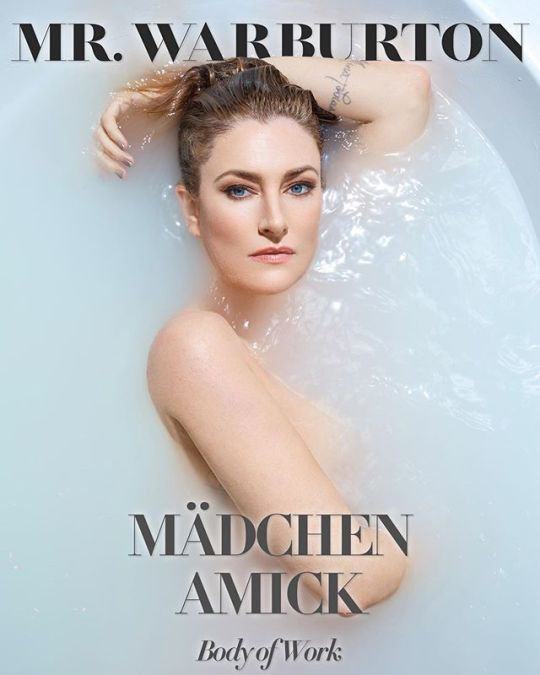
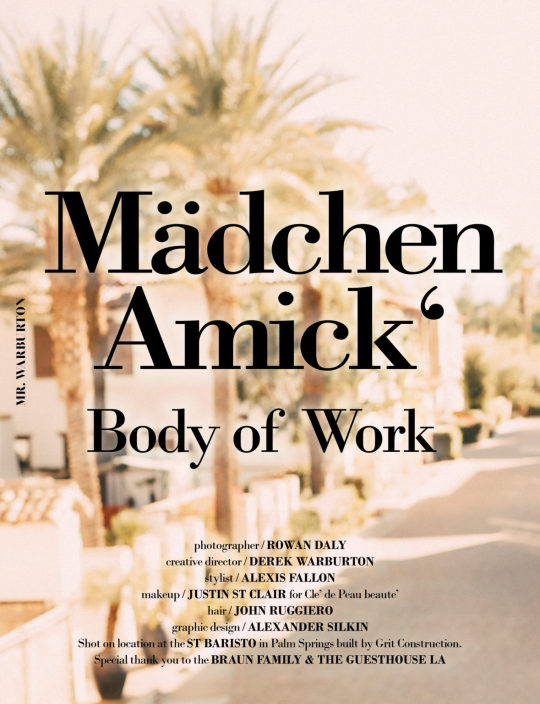
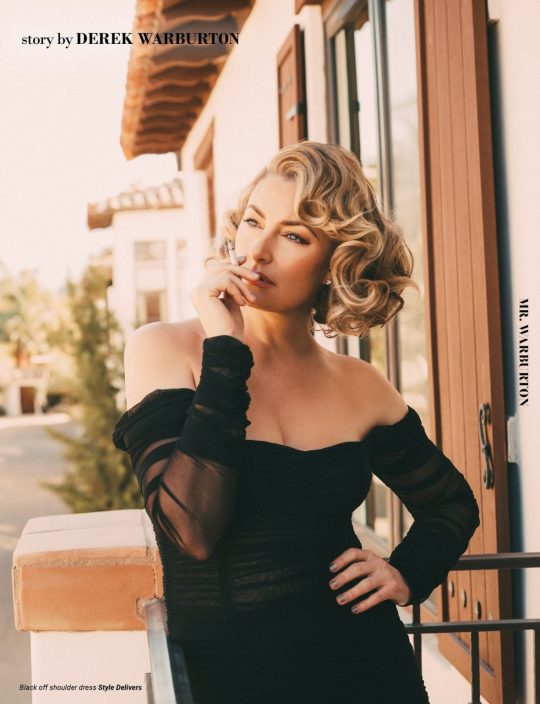
There are so many things you can say about Mädchen Amick. Actress, director, producer, free spirit, artist, muse and that just describes her career over the last 3 decades. Mädchen has a true artistic view as a creator. Having just celebrated her 49th birthday we talk; body, work ethic and of course one of her hit shows, RIVERDALE.
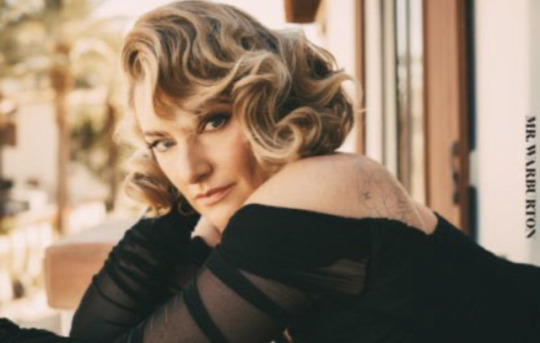
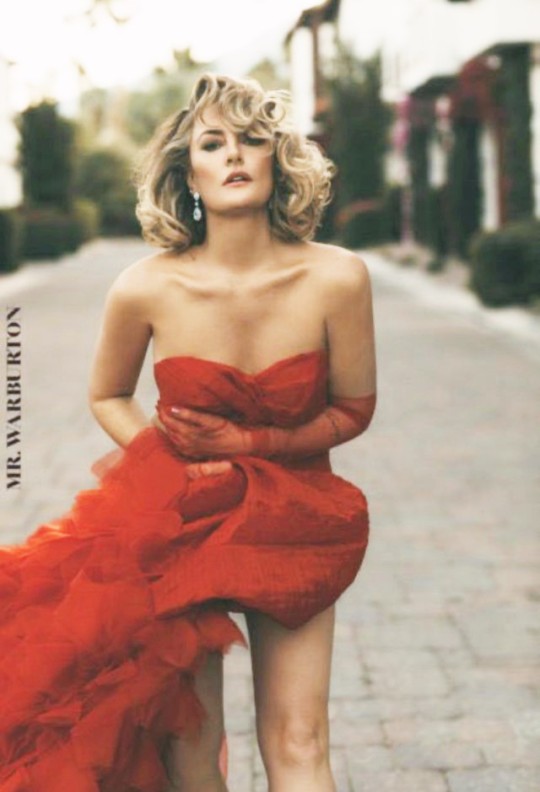
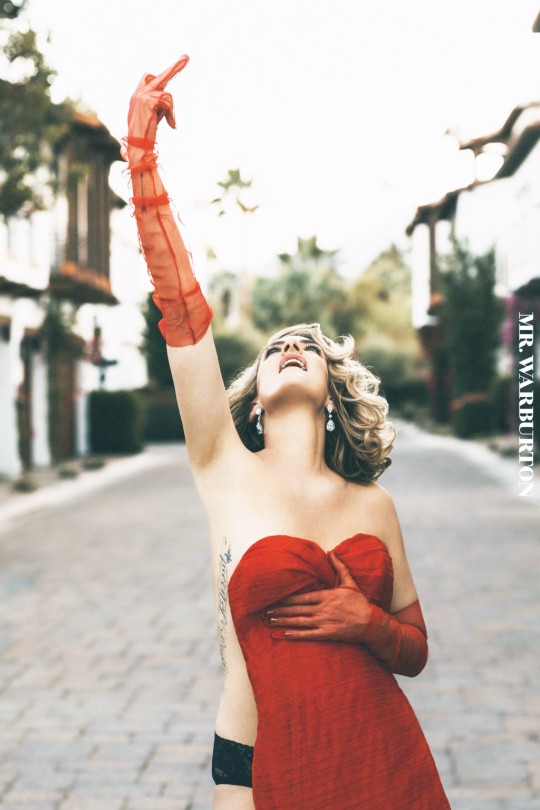
Mädchen started her career with Elite Models at 14 years old. Along with modeling, she was also a dancer and never had issues with her body. When she is working she is a free spirit, she says, “ just cut around my bits.”
“I have always just thought that clothing was optional, especially now as I am getting older I want to embrace my body, celebrate it. I am proud of my age and I love all of my wrinkles.”
- Mädchen Amick
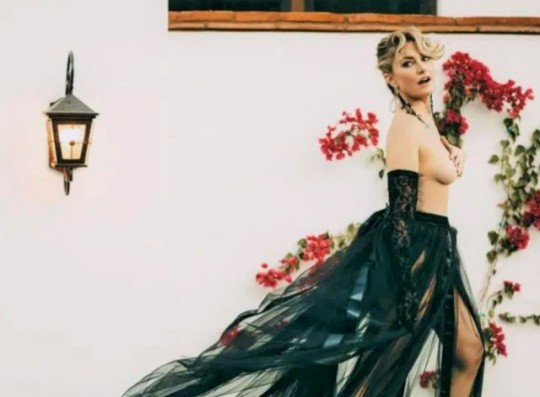
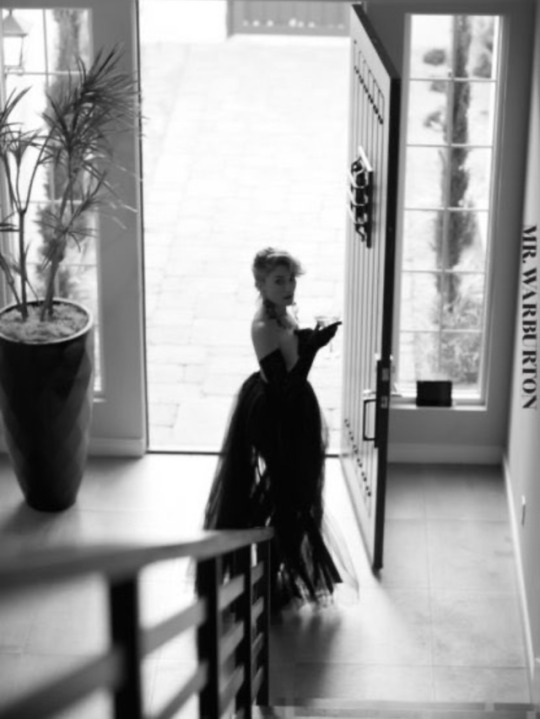
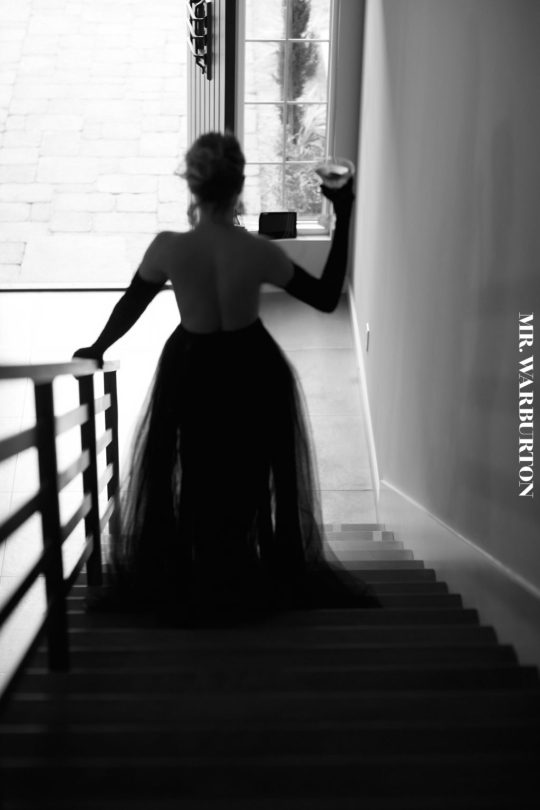
As a woman comfortable in her skin, she’s been open to many creative opportunities, but it hasn’t always ended well. Mädchen was filming a movie with the incredible James Spader directed by the legendary Nicholas Kazan. She and Nicholas had a very comfortable relationship even though there was a lot of nudity and although everything was professional during the filming process, some of the content that was released was anything but professionally handled. When the film was released the directors cut was beautiful and sensual and comfortable. But much to her surprise the producers did their own release and didn’t edit any of the original nudity. She felt violated. “ I don’t have inhibitions, but I didn’t feel good about that”. When asked about her feelings in the #TIMESUP movement, the actress says you just have to speak up. “ I always talk about everything and I always tell everyone on set what I am making, that’s how you even out the playing field”. Aside from the creative process, Mädchen shares her experiences with the financial aspects of being an actress. She learned about money in the entertainment business early from her mentor, David Lynch, the creator of one of televisions most memorable tv shows, TWIN PEAKS. “David always told me actors are unemployed 99% of the time, make your money last”. When talking about her career and TWIN PEAKS, Mädchen lights up. “To be on a hit tv show like TWIN PEAKS at the beginning of my career was unbelievable and now to be on 2 hit shows in my career is just amazing. I feel so lucky that lightning has struck twice.” Of course, she is talking about her newest CW hit show, RIVERDALE.
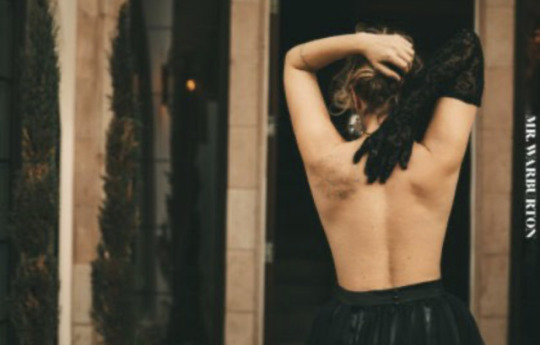
Mädchen’s tone changed when we started talking about RIVERDALE. Number 1 because she feels so blessed that it has become such a huge hit, with their highest-rated episode beginning in season 3. But also because of the loss of her dear friend, Luke Perry. I could feel her hurt. “Luke and I were real friends. I still reach for my phone every time I land back in Vancouver to go to dinner. He was my first phone call every time”. As many know legendary actor Luke Perry played Archies’ dad, Fred Andrews on the hit show. Perry at the age of 52 died suddenly from a stroke. “Luke was an old soul, and not only was he a father to his own children he was the father to our cast of kids. Luke would text me all the time and say, hey, you need to talk to the girls, they need advice”. Mädchen and Luke had a lot of career milestones in common, they both hit young. With the actress becoming an overnight success with her role in TWIN PEAKS and Perry’s role in BEVERLY HILLS 90210. Then they both decided that they wanted more normal lives. Mädchen adds, “it’s difficult to achieve a hit once in your career and then both Luke and I achieved 2.” She remembers that dreadful night of his sudden death like it was yesterday. KJ Apa, Archie Andrews, and Luke Perrys’ son on the show were on set and the entire cast and crew congregated to Mark Consuelos (Hiram Lodge, Veronica’s dad on the show) house. “ We cried and hugged for hours. We were devastated. He and I were Ma and Pa kettle to all these kids. We were all in shock. He is desperately missed”.

Despite the heartbreak of the beloved Luke Perry earlier this year, everyone has put on a brave face and is moving forward. Amick is becoming more involved with the RIVERDALE family but on the other side of the camera. “ I am thrilled to announce that I will be directing episode 19 of season 4 of RIVERDALE. I’m so thrilled to be working with the amazing creator of the show Roberto Aguirre-Sacasa.” Mädchen has directed documentaries and music videos before but this is her first stab at RIVERDALE.

When I asked her what her goals are going into her FAB FIFTIES she just laughed. ”I never want to take no for an answer. Watch out world I am here to conquer! I just want to keep working, loving my fabulous husband I have been married to for 32 years and continue to grow in my life and career, I gotta keep it sexy!” Now you can see why I titled her story BADASS.

PS readers…
I wanted to have fun with Mädchen. I asked her to play a game of word association with her cast from RIVERDALE. This is what we came up with….
KJ Apa: fiery Lily Reinhart: delicious Skeet Ulrich: playful Charles Melton: oooooh, mischievous Camilla Mendes: sassy Madelaine Petsch: a force Vanessa Morgan: an old soul Luke Perry: otherworldly

Be sure to watch RIVERDALE on the CW, check your local listings.
#madchen amick#mr warburton#cover#feature#these pix are amazing#more pix from this shoot to come#so many good ones they couldn't use them all#alice cooper#riverdale#parentdale#riverparents#rivermilfs
47 notes
·
View notes
Photo

MARJORIE MAIN
(Feb 24, 1890 – Apr 10, 1975) Main was an American character actress and singer of the Classical Hollywood period, best known as a Metro-Goldwyn-Mayer contract player in the 1940s and 1950s, and for her role as Ma Kettle in ten "Ma and Pa Kettle" movies. She started her career in vaudeville and theatre and appeared in films classics, such as "Dead End" (1937), "The Women" (1939), "Dark Command" (1940), "The Shepherd of the Hills" (1941), "Meet Me in St. Louis" (1944), and "Friendly Persuasion" (1956).
3 notes
·
View notes